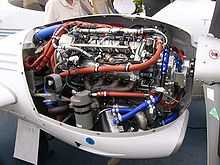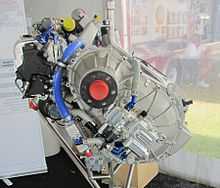Thielert Centurion
The Thielert Centurion is a series of Diesel cycle aircraft engines for general aviation built by Thielert. They are based on heavily modified Mercedes-Benz automotive engines.
Design
All Centurion engines are water-cooled, turbocharged and employ a single-lever digital engine management system (FADEC). This simplifies engine management for the pilot, as well as improving reliability, as it prevents the engine being operated improperly. The series utilizes either jet fuel or diesel fuel. The high compression ratio of the engine combined with the digitally controlled fuel injection system mirrors similar advances in automotive technology.[citation needed]
Centurion series engines are always fitted with constant speed propellers which allow the engine to be operated at optimum speed at all times. However, the normal operating speed is too high for any suitable propeller and so the propeller is driven through a reduction gearbox. The constant speed propeller and reduction gear result in a propeller tip speed that is 10-15% lower than comparable conventional avgas engines, reducing propeller noise.[citation needed]
The Diesel engine's high compression results in better fuel efficiency and the higher operating rpm of the Centurion allows higher power to be developed from a smaller displacement, in comparison to conventional aircraft piston engines.[citation needed]
A Centurion engine complete with CSU, reduction gearbox, turbocharger and FADEC engine management system is considerably heavier than the more conventional Continental and Lycoming engines with which it competes, but this weight disadvantage is compensated for by the Centurion's lower fuel consumption. Even though it lacks the magnetos and spark plugs of the conventional piston engines, the Centurion engines are considerably more complex.[citation needed]
Variants

Centurion 1.7
- The first product introduced by Thielert, a 1689 cm³ (103 in³) engine producing 135 hp (101 kW) is based on the Mercedes-Benz OM668 engine from Mercedes-Benz A-Class A 170 CDI (W168) with 80 mm bore and 84 mm stroke. Until the end of 2006, when production ceased in favor of the Centurion 2.0, more than 1,500 Centurion 1.7 had been built. The in-service record of the 1.7 has been poor,[citation needed] with a combination of design, service and support issues causing widespread customer dissatisfaction,[1] and resulting in Diamond designing its own engines to compete with Thielert.[citation needed]

Centurion 2.0
- Introduced in late 2006. The main difference is a new Mercedes-Benz OM640 engine cylinder block from the Mercedes-Benz A 200 CDI (W169) with a displacement of 1991 cm3 (Ø83 x 92 mm). Other improvements include a more compact FADEC, a lighter cast gearbox housing, interfaces for glass cockpits and a new service tool that allows the FADEC to be programmed in the field. Dimensions of the Centurion 2.0 and 1.7 are nearly identical and the install kits are compatible, so a 1.7 at the end of its life can be replaced with a 2.0. The Centurion 2.0 is rated for a power output of 135 hp (101 kW), the same as the 1.7, but is EASA and FAA certified for 155 hp (116 kW). It has accumulated more than 1,000,000 flight hours without mechanical failures as of April 2008.
Centurion 2.0 S
- This 4-cylinder turbodiesel with common rail direct injection and redundant FADEC control offers 155 hp (116 kW), thus providing a clearly perceptible increase in performance compared with the 135 hp (101 kW) Centurion 2.0. Despite of improved performance Centurion 2.0s weighs as much as the Centurion 2.0[2][3]
Centurion 3.2
- Intended to fill the gap between the Centurion 2.0 and the 4.0 and designed to produce 230 hp (172 kW). Development is largely complete, but the project is on hold.[citation needed]

Centurion 4.0
- Designed as a larger engine to replace the 300 hp (224 kW) gasoline engines, this new V8 design produces 350 hp (261 kW) and was developed from the Mercedes-Benz OM629 automobile engine. Initially equipped with two turbochargers, later changed to a larger single turbocharger. Certified only for Jet A & A1. After the insolvency of Thielert in April 2008 all work on the Centurion 4.0 was frozen.[citation needed]
Applications
Centurion 1.7
- Diamond DA40-TDI Star
- Diamond DA42 Twin Star
- Apex Aircraft Robin DR400 135 CDI Ecoflyer
- Cessna 172 ("F" and later models, modified under a Supplemental Type Certificate)[4]
- General Atomics MQ-1C Grey Eagle
Centurion 2.0
- Diamond DA42 Twin Star
- Diamond DA40
- Cessna 172 ("F" and later models, modified under a Supplemental Type Certificate)[4]
- Robin DR400 Ecoflyer
- TAI Anka Turkish Aerospace Industries MALE UAV
- Piper PA-28 Cherokee [5]
Centurion 3.2
- Cessna 182 - Proposed STC
Centurion 4.0
- Cirrus SR-22 (STC)
- Cessna 206 (STC)
- Cessna 340 - Proposed STC
- Cessna 414 - Proposed STC
- Cessna 421 - Proposed STC
- Beechcraft Duke - Proposed STC by Martin Hagensieker in collaboration with Gomolzig Flugzeug- und Maschinenbau GmbH
See also
- Comparable engines
- Related lists
References
- ↑ Bertorelli, Paul (2008-05-29). "Thielert's Flawed Economics (And Why the Company Knows It)". AVwebinsider. Retrieved April 26, 2012.
- ↑ "Featured Engine: Centurion 2.0S". GA Buyer Europe Magazine. December 2009. Retrieved 2013-08-27.
- ↑ "Centurion 2.0s – Jet Fuel Piston Engine with 155 hp". Centurion Engines. Retrieved 2013-08-28.
- ↑ 4.0 4.1 Federal Aviation Administration (November 2009). "Supplemental Type Certificate SA01303WI". Retrieved 19 May 2010.
- ↑ "STC for Piper PA". Centurion Engines. Retrieved 2013-08-27.
External links
- Centurion engines home page
- EASA Type Certificate Centurion 1.7 / 2.0
- EASA Type Certificate Centurion 4.0
| ||||||||||||||